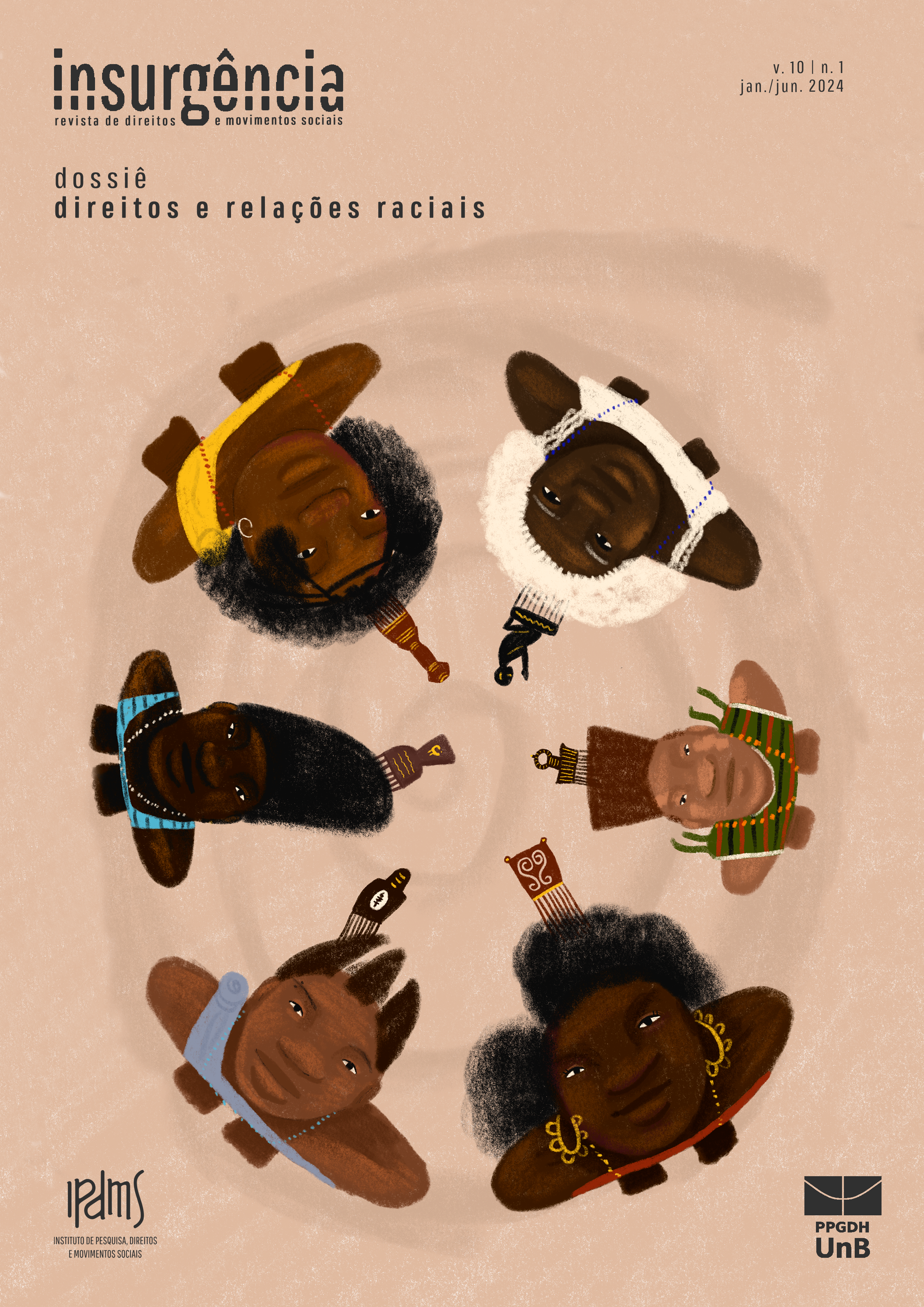Sex, money and modern slavery: trafficking of travestis and trans women from Brazil to Europe for sexual exploitation
DOI:
https://doi.org/10.26512/revistainsurgncia.v10i1.50069Keywords:
Modern slavery, Prostitution, Human trafficking, Trans women, TravestisAbstract
While sex and money may appear as subversive notions, attracting easily all the attention, it is also true that the issues raised in this article are, paradoxically, largely invisibilised. This invisibility seems to counterbalance the importance of the phenomena described in this work and justifies it in itself. Indeed, by coming back to the various mechanisms that lead to the immigration, voluntary or not, of Brazilian trans women and travestis to Europe, this article aims to emphasize the social and concrete realities suffered by these victims and related to their sexual exploitation. If, as we will see in our study, this particular migration is explained and driven by a strong desire to accomplish themselves more freely and decently in Europe and thus escape social realities such as discriminations and attacks that are part of their daily lives in Brazil, it is clear that when they arrive in Europe, these victims are confronted with a harsh reality, where their rights are violated and where a return to the past appears sometimes impossible. From a socio-anthropological and legal perspective, the objective of this work is to look at the characteristics of this sexual trafficking, which, as we shall see, can be identified as a form of modern slavery. We will, therefore, discuss the key notions and concepts related to this issue, before analyzing the concrete manifestations of this form of modern slavery and attempting to explain it.
References
ALONSO, Esteban J. P. Tratamiento jurídico-penal de las formas contemporáneas de esclavitud. In: ALONSO, Esteban J. P. Alonso (dir.). El derecho ante las formas contemporáneas de esclavitud. Valência: Tirant lo Blanch, 2017.
AIZURA, Aren Z. Trans feminine value, racialized others and the limits of necropolitics. In: HARITAWORN, Jin; KUNTSMAN, Adi; POSOCCO, Silvia (ed.). Queer necropolitics. Nova Iorque-Abingdon: Routledge, 2014.
ASSOCIAÇÃO BRASILEIRA DE LÉSBICAS, GAYS, BISSEXUAIS, TRAVESTIS, TRANSEXUAIS E INTERSEXOS. Do luto à luta: violência contra defensores de direitos humanos LGBTI+ no Brasil, 2021.
BENJAMIN, Harry. The transsexual phenomenon. Nova Iorque: Inc. Publishers, 1966.
BENTO, Berenice. O que é transexualidade. São Paulo: Brasiliense, 2008.
BRONSTEIN, Arturo. Erradicación del trabajo forzoso: perspectivas desde Ginebra, Estrasburgo y San José. Revista de Derecho Aplicado LLM UC, Santiago do Chile, n. 4, ago.-dez. 2019.
BUTLER, Judith. El género en disputa: el feminismo y la subversión de la identidad. Barcelona: Paidós, 2007.
CARVALHO, Henrique R. de. Operação Cinderela: trabalho escravo contemporâneo e diversidade de gênero no Brasil. In: FIGUEIRA, Ricardo R., A. A. PRADO, Adonia A.; MOTA, Murilo P. da. Escravidão ilegal: migração, gênero e novas tecnologias em debate. Rio de Janeiro: Mauad X, 2022.
CUNHA, Leonam L. N. La dictadura binaria del género y la patologización de las trans-identidades: un análisis foucaultiano y algunas cuestiones conceptuales. In: IBÁÑEZ, María L. M.; PÉREZ, Marta del P. (ed.). Estudios interdisciplinares de género. Valência: Tirant lo Blanch, 2020.
CUNHA, Leonam L. N. Queerizar el derecho: una estrategia para analizar el reconocimiento de derechos trans en España y Brasil bajo el paradigma de los derechos humanos. Salamanca: Programa de Doctorado en Estado de Derecho y Gobernanza Global, Facultad de Derecho, Universidad de Salamanca, 2021.
CUNHA, Leonam L. N. Queer Methodologies in the Study of Law: Notes about Queering Methods. Australian Feminist Law Journal, Londres, v. 49, n. 1, p. 159-184, 11. abr. 2023.
DOAN, Petra. You’ve come a long way, baby: unpacking the metaphor of transgender mobility. In: BROWN, Gavin; BROWNE, Kath (ed.). The Routledge Research Companion to Geographies of Sex and Sexualities. Nova Iorque-Abingdon: Routledge, 2016.
DUQUE, Tiago. Montagens e Desmontagens: desejo, estigma e vergonha entre travestis adolescentes. São Paulo: Annablume, 2011.
EDMONDS, Alexander. “The poor have the right to be beautiful”: cosmetic surgery in neoliberal Brazil. Journal of the Royal Anthropological Institute, Londres, v. 13, n. 2, p. 363-381, 15. maio 2007.
ESCRITÓRIO DAS NAÇÕES UNIDAS SOBRE DROGAS E CRIME (UNODC). Relatório nacional sobre tráfico de pessoas: dados 2017 a 2020, 2021. Disponível em: https://www.gov.br/mj/pt-br/assuntos/sua-protecao/trafico-de-pessoas/publicacoes/relatorio-nacional-trafico-de-pessoas_2017-2020.pdf
G1 RIBEIRÃO PRETO E FRANCA. Operação Cinderela: 6 são presos por suspeita de exploração de transexuais em Ribeirão Preto. G1, Ribeirão e Franca, 13 mar. 2019. Disponível em: https://g1.globo.com/sp/ribeirao-preto-franca/noticia/2019/03/13/operacao-cinderela-investiga-exploracao-de-transexuais-em-ribeirao-preto.ghtml.
GOLDMAN, Dalia. Esclavos siglo XXI: maquiladoras, explotación sexual y otras formas de servidumbre. Cidade do México: L. D. Books, 2014.
GOMES, Nilma L. Sem perder a raiz: corpo e cabelo como símbolos da identidade negra. Belo Horizonte: Autêntica, 2006.
HIRSCHFELD, Magnus. Transvestites: the erotic drive to cross dress. Buffalo: Prometheus Books, 1992 [1910].
HUTTA, Jan S.; BALZER, Carsten. Identities and citizenship under construction: historicising the ‘T’ in LGBT anti-violence politics in Brazil. In: TAYLOR, Yvette; M. ADDISON, Michelle (eds.). Queer Presences and Absences. Basingstoke: Palgrave Macmillan, 2013.
INTERNATION LABOUR ORGANIZATION, WALK FREE FOUNDATION; INTERNATIONAL ORGANIZATION FOR MIGRATION. Global Estimates of Modern Slavery. Genebra, 2017. Disponível em: https://www.ilo.org/wcmsp5/groups/public/---dgreports/---dcomm/documents/publication/wcms_575479.pdf
INTERNATIONAL SOCIETY OF AESTHETIC PLATIC SURGERY. International Survey on Aesthetic/Cosmetic, 2016. Disponível em: https://www.isaps.org/medical-professionals/isaps-global-statistics/
JARRÍN, Alvaro. Towards a biopolitics of beauty: eugenics, aesthetic hierarchies and plastic surgery in Brazil. Journal of Latin American Cultural Studies, v. 24, n. 4, p. 535-552, 2015.
JARRÍN, Alvaro. Untranslatable subjects: travesti access to Public Health Care in Brazil. Transgender Studies Quarterly, v. 3, n. 3-4, p. 357-375, 2016.
JARRÍN, Alvaro. The biopolitics of beauty: cosmetic citizenship and affective capital in Brazil. Berkeley: University of California Press, 2017.
JESUS, Jaqueline G. de. (2012). Orientações sobre identidade de gênero: conceitos e termos. Brasília.
KOMETANI, Pâmela. Transexuais enfrentam barreiras para conseguir aceitação no mercado de trabalho. G1, São Paulo, 12 set. 2017. Disponível em: https://g1.globo.com/economia/concursos-e-emprego/noticia/transexuais-enfrentam-barreiras-para-conseguir-aceitacao-no-mercado-de-trabalho.ghtml
KULICK, Don. Travesti: prostituição, sexo e cultura no Brasil. Rio de Janeiro: Editora Fiocruz, 2008.
LEWIS, Holly. La política de todes: feminismo, teoría queer y marxismo en la intersección. Barcelona: Bellaterra, 2020.
LINS JÚNIOR, George S.; MESQUITA, Lucas I. S. Neoconstitucionalismo ou supremocracia? Uma análise do ativismo judicial no reconhecimento do nome social de pessoas trans na ação direta de constitucionalidade nº 4.275. Revista Direitos Fundamentais & Democracia, Curitiba, v. 4, n. 1, p. 161-190, 2019. Disponível em: https://revistaeletronicardfd.unibrasil.com.br/index.php/rdfd/article/view/1442/574
MARILAC, Luísa; QUEIROZ, Nana. Eu, travesti: memórias de Luísa Marilac. Rio de Janeiro: Record, 2019.
MESQUITA, Lucas I. S. Escravidão contemporânea: definições, evolução hermenêutica e sua reprodução. In: Temas de crítica ao direito, vol. 2. Maceió: EDUFAL, 2022.
MORALES, Ricardo M. Las nuevas formas de esclavitud en los textos constitucionales y declaraciones internacionales de derechos. In: ALONSO, Esteban J. P. et al. (dir.). El derecho ante las formas contemporáneas de esclavitud. Valência: Tirant lo Blanch, 2017.
NERY, João W. Velhice transviada. Rio de Janeiro: Objetiva, 2019.
OLIVEIRA, Jôyara M. S. de; ANJOS, Hildete P. dos. Trabalho escravo contemporâneo: a disputa ideológica na produção de um conceito. In: FIGUEIRA, Ricardo R.; PRADO, Adonia A.; GALVÃO, Edna M. (org.). Escravidão: moinho de gentes no século XXI. Rio de Janeiro: Ed. Mauad X, 2019.
PATRÍCIO, Maria C. No truque: transnacionalidade e distinção entre travestis brasileiras. Recife: Programa de Pós-Graduação (Mestrado) em Antropologia da Universidade Federal de Pernambuco, 2008.
PEREIRA, Marcela R. Trabalho escravo contemporâneo: onde se encontram as mulheres? Belo Horizonte: Editora Conhecimento, 2020.
PISCITELLI, Adriana. Entre as ‘máfias’ e a ‘ajuda’: a construção de conhecimento sobre tráfico de pessoas. Cadernos Pagu, v. 31, 2008.
PLASSAT, Xavier. Ciclo de debates: Entre a escravidão e a busca pela dignidade do trabalho. Trabalho escravo contemporâneo: história e denúncia. Rio de Janeiro, 2020. Vídeo 148 minutos. Transmitido ao vivo em 19 out. 2020 via YouTube. Disponível em: https://www.youtube.com/watch?v=0fosgCmbfRw
REPÓRTER BRASIL. Trabalho escravo contemporâneo: 20 anos de combate (1995-2015), 2015. Disponível em: https://reporterbrasil.org.br/wp-content/uploads/2015/02/folder20anos_versaoWEB.pdf
ROJAS CASTRO, Daniela; ZARO ROSADO, Iván; NAVAZO FERNÁNDEZ, Teresa. Trabajadoras transexuales del sexo: el doble estigma. Madri: Fundación Triángulo, 2009.
SUZUKI, Natália. (org.). Trabalho escravo e gênero: quem são as mulheres escravizadas no Brasil? São Paulo: Repórter Brasil, 2020. Disponível em: http://escravonempensar.org.br/wp-content/uploads/2020/09/GENERO_EscravoNemPensar_WEB.pdf
TAMPEP. Sex work in Europe: a mapping of the prostitution scene in 25 European Countries, 2009. Disponível em: https://tampep.eu/resources/
TAVARES, Bruno. Operação Fada Madrinha prende 5 por suspeita de tráfico internacional de transexuais brasileiras. G1, Ribeirão e Franca, 9 out. 2018. Disponível em: https://g1.globo.com/sp/ribeirao-preto-franca/noticia/2018/08/09/operacao-fada-madrinha-apura-suspeita-de-trafico-internacional-de-transexuais-e-trabalho-escravo.ghtml.
TEIXEIRA, Flávia do B. L’Italia dei Divieti: entre o sonho de ser européia e o babado da prostituição. Cadernos Pagu, n. 31, 2008.
UNITED NATIONS. Protocol to prevent, suppress and punish trafficking in persons especially women and children, supplementing the United Nations Convention against Transnational Organized Crime, 2000. Disponível em: https://www.ohchr.org/en/instruments-mechanisms/instruments/protocol-prevent-suppress-and-punish-trafficking-persons
VARTABEDIAN, Julieta. Brazilian travesti migrations: gender, sexualities and embodiment experiences. Cambridge: Palgrave Macmillan, 2018.
Downloads
Published
How to Cite
Issue
Section
License
Copyright (c) 2024 InSURgência: revista de direitos e movimentos sociais [InSURgence: rights and social movements journal]

This work is licensed under a Creative Commons Attribution-NonCommercial-NoDerivatives 4.0 International License.
Creative Commons Atribuição-NãoComercial-SemDerivações 4.0 Internacional.
















